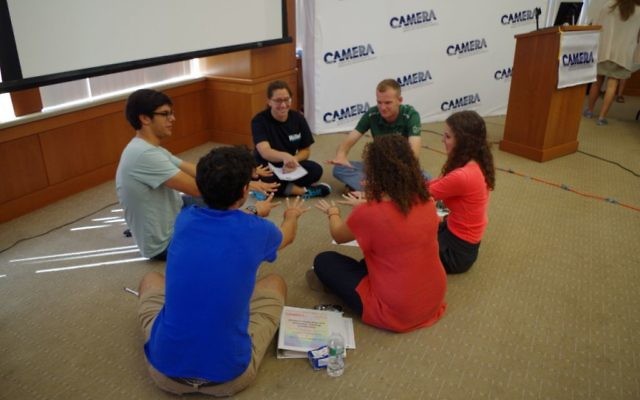A Snapshot of Campus Anti-Semitism
By Lindsey Cohen | Guest Columnist
We came from England. We came from Canada. We came from across the United States, converging at a four-day conference in Boston.
We were seeking knowledge, seeking support and seeking skills to deal with the rise of anti-Semitism on college campuses.
A global fight is going on.
Jewish students have gotten the message. We didn’t need CNN to tell us about the boycott, divestment and sanctions movement or anti-Israel professors. We know about them because we meet
them all the time.
The National Demographic Survey of American Jewish College Students found that 54 percent had experienced anti-Semitism on campus in the first six months of the 2013-14 academic year.
Professors Barry Kosmin and Ariela Keysar asked 1,157 students about the types, context and locations of anti-Semitism they had experienced and found that anti-Jewish attitudes are a problem for Jews at all levels of religious observance.
Kosmin and Keysar’s survey comes after the Pew Research Center’s 2013 Portrait of Jewish Americans, which found that 22 percent of young Jews reported being called an offensive name in the previous year just for being Jewish. That percentage is far higher than for older Jews, but this situation is not new. Twelve years ago, the U.S. Commission on Civil Rights declared that campus anti-Semitism had become a serious problem.
You’d think such studies would have made the fact of campus anti-Semitism more widely known. Yet much of the American population seemed shocked when Rachel Beyda made national headlines this year for the discrimination she faced at UCLA.
“Given that you are a Jewish student and very active in the Jewish community,” she was grilled by a member of the student council, “how do you see yourself being able to maintain an unbiased view?”
In other words: Given your ethnicity, Rachel, how can you have any integrity?
It’s an incredibly offensive question but sadly not too surprising. At the conference I attended on campus anti-Semitism — hosted and run by the Committee for Accuracy in Middle East Reporting in America — I met more than 60 other students from 45 universities who suffered similarly offensive anti-Semitic encounters on campus.
Last year, one of the CAMERA conference attendees was assaulted at Temple University merely for speaking up on behalf of Israel. Another girl at our conference said students at York University in Canada were glorifying terrorism and inciting violence on the social media pages belonging to the student council; splashing red paint on Jewish property; and intimidating Jewish students walking to class — and university administrators have done nothing, despite repeated pleas from Jewish students.
Another girl, this one from London, told me, “Just mentioning the word Israel can cause tension.”
Campus extremism, she said, is a serious problem in Great Britain. That’s why she flew all the way to Boston; she needed a feeling of support.
Anti-Semitism is back, folks, all over the world.
We students are the ones facing the brunt of it. It is only a matter of time before one of us is seriously hurt or killed.
How did it come to this? How can Jewish students begin to deal with this global anti-Semitism on college campuses?
Here’s an idea: Start paying attention to what’s happening on college campuses. Put pressure on administrations and alumni associations. Hit them financially and in the media. Let’s talk about campus reforms that need to take place. Let’s hold universities to account for hiring professors who are obsessed with anti-Israel feelings, and let’s make such awful people household names.
Let’s make sure every Jewish family knows which universities are hostile and which are not. Last but not least, we must help young people know about useful organizations like CAMERA that are there to support and train them for the realities of campus life.
At CAMERA’s conference we role-played, practiced debate, studied history, worked on writing skills, and held mock BDS student council meetings, even trained in Israeli martial arts. That is, we did real, serious, practical things — crucial for what we’ll face on campus.
It’s time to get serious. BDS and other anti-Semitic organizations are organized, ambitious, loud and making progress on college campuses. Too many pro-Israel events and organizations are, I fear, not responding adequately. They often seem content to wave the Israeli flag or to organize feel-good rallies, or they seem like summer camp, a place to meet the opposite sex.
Enough already.
We need serious preparation now.
If we get serious, Jewish students might not feel so besieged anymore.
Lindsey Cohen is from Atlanta. She attended Riverwood International Charter School and is now at Boston University.






comments